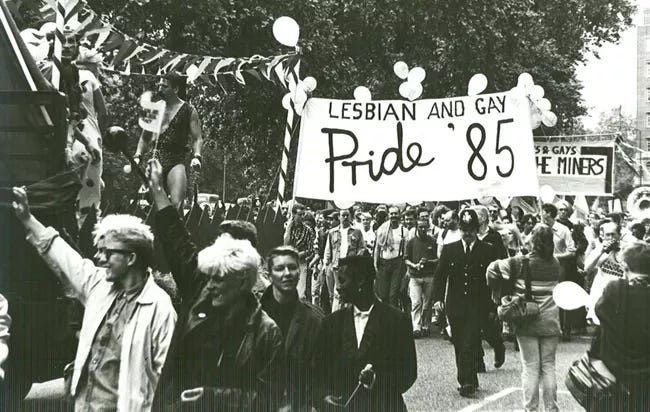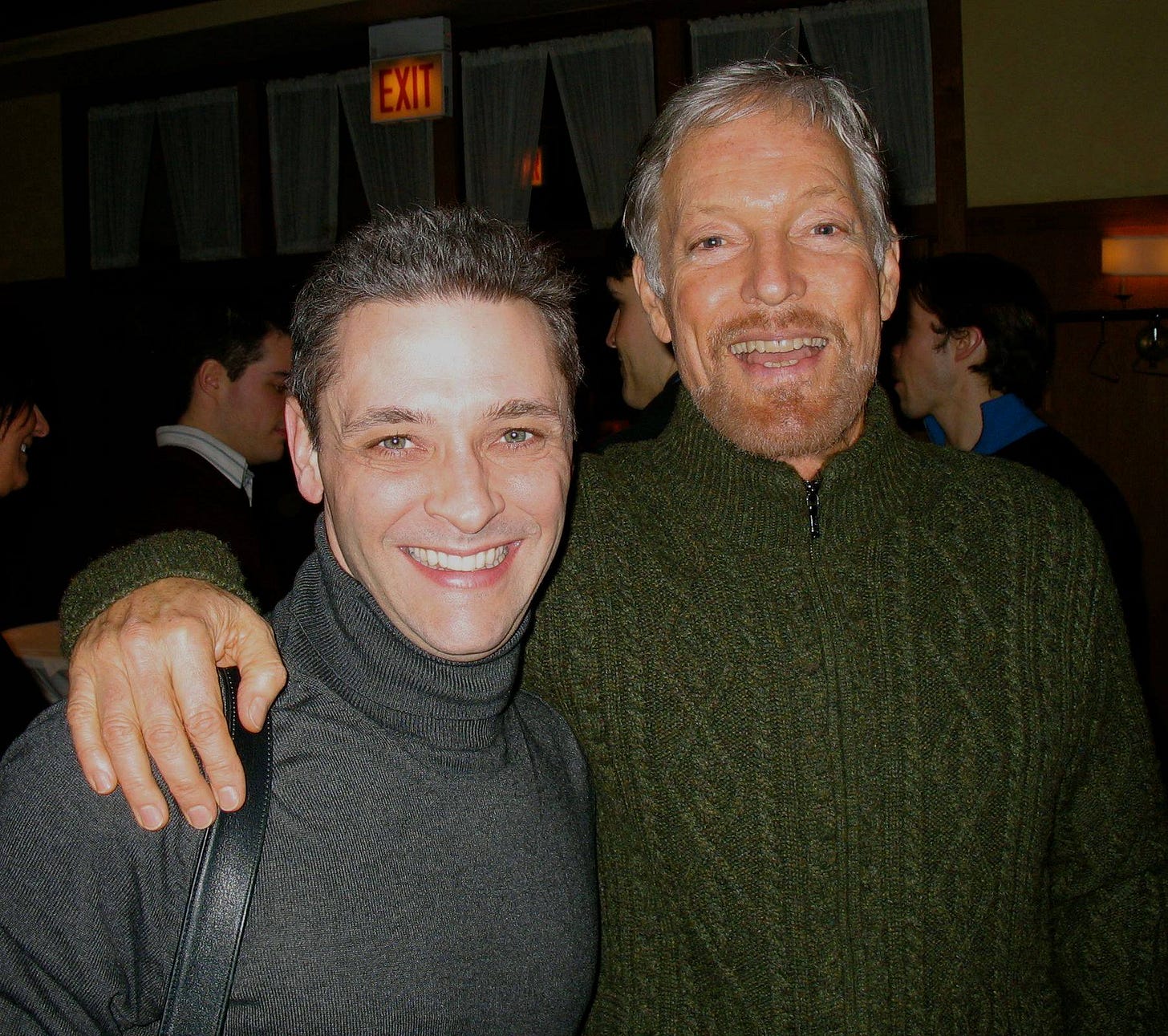The Case for Pride
The entire Gay Rights movement has happened in my lifetime; we have a lot to be proud of—and grateful for.
In 2008, I was touring with a Broadway show. We were arriving in a new city during Pride, and some of us were making plans to take part in the festivities. An assistant on the production, about 15 years my junior, started grumbling. “We don’t need Pride,” he said. Did he mean the Pride parade or Pride in general? I wondered.
“Both,” he muttered. “Pride is embarrassing. It makes us look bad. We don’t need it.”
“Yes we do,” I said.
He continued insisting it isn’t necessary. I’ve watched this sentiment grow among younger generations over the years, and while I can understand where the sentiment comes from, I ultimately disagree.
This young man came from a very conservative, old money Republican family, and he was not at all out to them. He was in a relationship with a man he had feelings for, but it was all on the down-low. So, of course he found flamboyant displays of out gayness objectionable—even threatening. We got into an animated argument about Pride, and in the end, agreed to disagree. Here’s what I told him. It’s what I’d like to tell young LGBT+ people and their allies as they take to the streets this month.
We need Pride because if nothing else, it’s the ultimate expression of being out. When I came out at 18 in the early ‘80s, Pride was a radical expression of what was, at that time, not only a radical, but a dangerous act—being openly gay. I’d been bullied my entire life up until that that point, and with the AIDS epidemic ravaging the generations ahead of me, it began to feel necessary for me to declare my gay identity—not just for myself, but for others like me, in places in the world where to be out meant certain death; for those whose lives were cut short by the virus that today I treat with a pill every morning.
So, you bet—I get the desire many in the tribe have to be out, in a big way, once a year. That includes the outrageous, the subversive, the go-go boys and leather men and dykes on bikes. Many, including the young friend from my story, feel these displays are harmful to regular LGBT+ folks just trying to live their lives, and don’t want to be associated with them. They don’t see the point any more of such defiant and outré displays. I understand their argument, and sometimes, when things veer into bad taste or indecency, I even agree. But it was the struggle toward outness that has always been at the heart of Pride and the Gay Rights movement, and for that reason alone I feel it is worth preserving. We can’t be equal members of society if we can’t walk in the sun, as ourselves, with the ones we love. Harvey Milk (the first openly gay man to be elected to public office in California who was later assassinated in 1978) put it best: “If you’re not free to be yourself in that most important of all human activities—the expression of love—then life itself loses its meaning.”
On that Broadway tour I mentioned, I worked for a few months with Richard Chamberlain. Richard was one of the first celebrities to be outed in the 1980s. He had been, for decades, a square-jawed, masculine heart throb, as TV’s Dr. Kildare and as the shirt-ripping hero of miniseries like The Thorn Birds. I had one dinner with Richard, and I asked him about the ordeal he’d gone through—the subject of his book, Shattered Love. He told me that being outed destroyed his career and upended his life. Being openly gay was simply not possible for him, and his outing—an unfair and politically driven violation of Richard’s privacy—drove him out of the business and to Hawaii, where he lived for a couple decades in relative anonymity. The show he and I did together was part of his comeback—at 75—and I’m glad to say he’s going strong at 90, and still with his partner of over 25 years.
As I sat listening to this man who had been an actor hero of mine when I was a stagestruck kid, I felt enormous gratitude. I came out around the time Richard was outed. I was an acting student in college and I was bullied for it—by gay acting teachers no less—who told me I would have to “butch it up” and “pass for straight” if I was to have any chance of a career. I chose to begin in the business as an openly gay actor, and it wasn’t easy. It made me think about the sacrifices Richard made just to do the work he loved. Gratitude. This is my theme, young friends.
To me, it’s impossible to express Pride without a sense of gratitude. It’s great to be proud of who you are; even defiant if need be. But there’s a difference between pride and arrogance. None of us got to where we are by ourselves. It’s ultimately hubris—not pride—to approach June’s celebrations with no awareness of your part in the continuity of the legacy of those who fought and secured your right to express yourself freely. Sure, there’s still injustice in the world, and yes, there are things worth protesting. But there’s also much to celebrate, to share, to embody and express: generosity, joy, laughter, style, courage, and above all, humanity. These qualities and more are the essence of what being gay in the world has always meant to me.
Why? Because I was lucky enough to have gay mentors who passed on to me our vibrant gay culture, literature, and history. My mom, who ran her own theater company, brought laudable gay men into my life whom I looked up to. Paul and his partner Charles took me into their home after college (during which I’d lived with my mother) in the South End neighborhood of Boston so I could experience gay life. Paul gave me the books that changed his life, and that would end up changing mine: books by Edmund White, E.M. Forster, Andrew Holleran, Quentin Crisp, and Oscar Wilde. Reading James Baldwin’s Giovanni’s Room I felt seen, really seen, for perhaps the first time. He was telling my story from a very different “lived experience,” yet I felt a deep sense of kinship with him. My gay mentors in show business turned me on to all the classic Hollywood films they were able to quote on cue: All About Eve, Auntie Mame, The Women. I was introduced to the vibrant gay club world by older friends and there I discovered where all the great music was heard first. Gay men and dance club culture made stars of Madonna, Martha Wash, and many more, before they hit the mainstream airwaves and MTV. Aw, kids. You should have been there.
Gratitude. It’s important. Get curious. Go on, I dare you. Listen: I know you’re fired up, and you want the world to see you and to validate you and you want to make change. But here’s something you might consider: you can’t change something if you don't understand and appreciate the history that brought you to this point. This is a young movement that’s wrought incredible change in just a half a century. I’m only 58—not old, thank you very much—which means that if Stonewall was the seminal event that launched the Gay Rights movement, then the entire movement has happened in my lifetime. We’d do well to not take for granted our hard-earned rights and privileges.
Think about it. We’ve fought the mob, the cops, the homophobic media, discrimination in hiring, housing, healthcare and the justice system. We defeated the designation of our sexual orientation as mental illness; we endured a plague exacerbated by fear, hate, and government indifference. We took marriage equality all the way to the Supreme Court and won—and that wasn’t even a decade ago. There is so much to be proud of. This year, I encourage you all to express love rather than rage. To consider what you have to be grateful for. Express gratitude and joy instead of defiance and confrontation. Express real dignity by being an example—not just to other gay people—but to anyone who wants to walk generously, authentically, in the world.
So, what happened to my friend from the tour? Well, shortly after our debate, he left to go on to even bigger and brighter work in the industry. A couple months later, I was in a hotel room unpacking and he called me out of the blue. He said, “You were right. I was wrong. What books should I read?”
See, after he left our tour, his boyfriend gave him an ultimatum: tell your family about us, or we’re through. Finding the courage to risk his family’s rejection forced him to confront the homophobia he recognized in himself, and he experienced coming out as I had: as an act of self love. I said, “Okay, get a pen,” and I started listing books and movies and recordings and stories that had been passed on to me way back when. Curious? I’m happy to make recommendations.
We welcome you to share your thoughts on this piece in the comments below. Click here to view our comment section moderation policy.
The opinions expressed here do not necessarily reflect those of the Foundation Against Intolerance & Racism or its employees.
In keeping with our mission to promote a common culture of fairness, understanding, and humanity, we are committed to including a diversity of voices and encouraging compassionate and good-faith discourse.
We are actively seeking other perspectives on this topic and others. If you’d like to join the conversation, please send drafts to submissions@fairforall.org.





I wonder if those who commented even read my piece. You couldn't have. It's a piece expressing love and gratitude for my mentors, my culture, those who gave their lives so I and others can live freely. I encourage young people to express joy and dignity. It's disheartening that response to it has to be so ugly. I guess there are limits to Tolerance even amongst those who align with the Foundation Against Intolerance and Racism.
For the record, and for those interested: I've been very clear in my writings about my views regarding "queer" culture for kids: https://jamesbeaman.substack.com/p/what-is-kid-friendly-gay-culture
Also my feelings about the Progressive Pride flag and much of what it represents: https://jamesbeaman.substack.com/p/flagging
And the LGBTQ+ community: https://jamesbeaman.substack.com/p/community-credulity